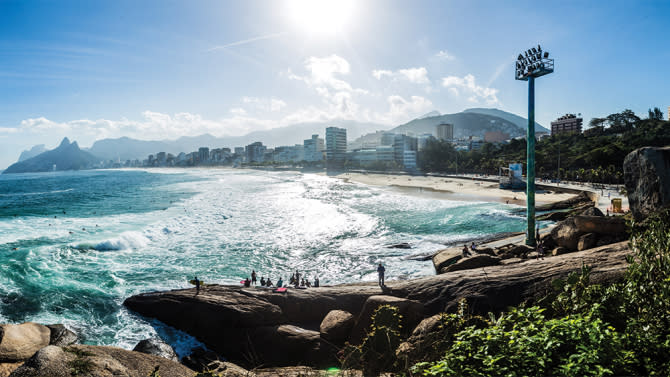Rio Gets Ready for Massive Olympics Media Blitz

Most Olympic Games generate controversy, but this year’s edition in Rio de Janeiro seems to offer an even more generous dose of negativity, including the dust-up surrounding the doping of Russian athletes and fear of the Zika virus, which is keeping some athletes away — all set against the backdrop of Brazil’s ailing economy and ongoing political crisis.
But perhaps the biggest non-sports story at the Olympics is one that will generate little publicity in and of itself: the behind-the-scenes logistics and sheer complexity of producing the television and digital coverage that will bring the games to the screens, big and small, of billions of viewers around the world.
The numbers are staggering. About 25,000 broadcasters, journalists, and other media pros from more than 200 countries will cover the games, which start Aug. 5 with opening ceremonies at Maracana Stadium. Approximately 15,000 broadcast and print journalists will be based in the Intl. Broadcasting Center and Main Press Center, located side-by-side in Rio’s Olympic Park in the Barra neighborhood, where the bulk of the competition will take place. Another 10,000 media reps will work out of the Rio Media Center in the center of town.
Waves of Publicity: Brazil hopes cameras will be focused on sights like the beaches of Ipanema. Renato Sette Camara/Prefeitura do Rio |
The IBC boasts 12 full-blown TV studios, and is adjacent to the headquarters of Olympic Broadcasting Services, created in 2001 by the Intl. Olympic Committee to serve as the host broadcaster for all Olympic Games. The OBS content is delivered to nearly 100 broadcasters that hold rights to the Games in their respective countries and have paid the IOC to use the facilities.
Olympic Broadcasting Services will produce and transmit a combined 7,100 hours of live coverage from every sports venue, using a workforce of more than 7,000 people — up from the 6,000 who worked the London games in 2012. More than 1,000 cameras will be deployed.
Media companies are sending massive teams to Rio. Besides Brazil and the U.S., Germany, Japan, and China will have the most reps, with China’s Xinhua News Agency dispatching 119, according to the agency’s Rio office director Chen Weihua. “This will be the largest Xinhua team to cover an edition of the Olympics,” he says.
NBCUniversal will handle U.S. coverage, as it has since 1988 (when it was NBC), and will deliver broadcast content and will feed other outlets owned by parent Comcast, including USA Network, MSNBC, Bravo, and Telemundo.
The Olympics have always pushed the limits of technology, and this year is no exception, with the biggest strides being made in the delivery of 4K and streaming. The 4K format, which provides four times the resolution of HDTV, has been making only gradual inroads into broadcasting, slowed by its high cost. NBC will distribute portions of the games in 4K, including the opening and closing ceremonies and select events such as swimming, basketball, and the men’s soccer
final. The network will live-stream 4,500 hours of content to subscribers for viewing on desktops, tablets, and smartphones — not to mention TV sets.
Olympic Numbers | |||
There will be 18% more live sports coverage at the Rio Games than there was in London in 2012. | |||
21k | Broadcast and print journalists | ||
12 | TV studios located at the Intl. Broadcast Center | ||
7.1k | Hours of live sports coverage | ||
1k | Number of cameras deployed by Olympic Broadcasting Services | ||
Japan’s NHK network will experiment with capturing images in the even higher-resolution 8K format (16 times the resolution of HDTV), although those pictures will have to be converted down to 4K to fit into existing broadcast pipelines.
Another technology making an appearance: virtual reality. The Canadian Broadcasting Corp., for one, will offer 100 hours of 360-degree coverage. The images will be viewable on headsets that are compatible with the broadcaster’s signal.
Naturally, Brazil aims to take advantage of all this media attention to cast itself in a good light on the world stage. Fifteen
press areas have been set up as bases from which cameramen will be able to lens Rio’s iconic sights, such as Ipanema and Copacabana beaches and the recently renovated port area.
“Rio Media Center is the perfect base for journalists to learn about the transformations Rio underwent in the years before the Games,” the city’s mayor, Eduardo Paes, tells Variety.
There’s hope that the Olympics telecasts will reverse the bad publicity the country has been getting. “The coverage is now negative, but as the Olympics kick off, I believe it will change,” says Mac Margolis, the Rio-based correspondent of Bloomberg View.
While many pin high hopes on the power of media, others are skeptical. “The PR team in charge of the press is experienced,” says Andrew Downie, who will cover the Games for Thomson Reuters, “but bureaucracy in Brazil is a nightmare and slows you down.”
Related stories
IOC Sets Post-Rio Launch for Olympic Channel Free Over-the-Top Video Service
NBC Turns to Digital Influencers to Draw TV-Averse Millennials to Olympics Coverage
Czech Republic Entices Foreign Productions With Low Costs, 20% Rebate
Get more from Variety and Variety411: Follow us on Twitter, Facebook, Newsletter


